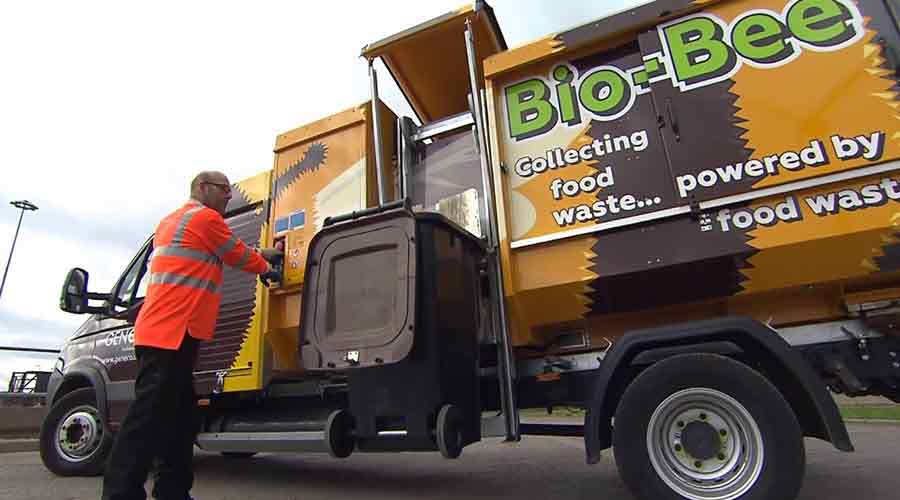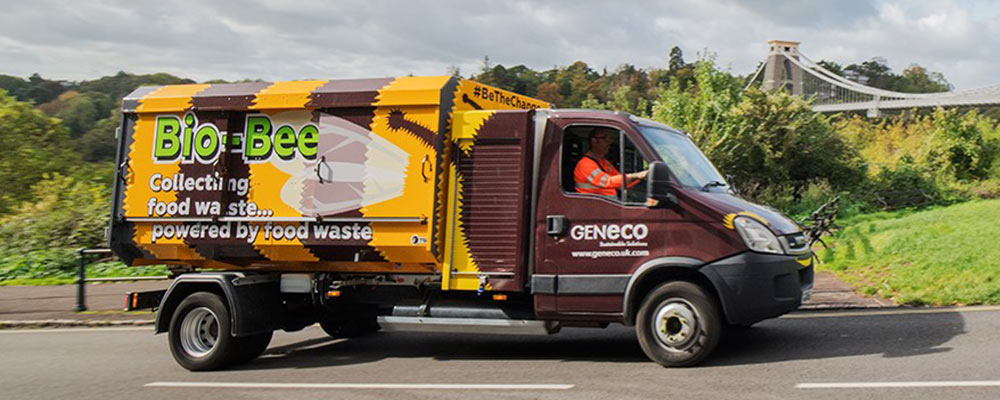Meet Bio Bee: UK’s first vehicle that collects & runs on waste.
Yes, you read it right about the Bio Bee vehicle. Bio Bee not only collects waste but also runs on it. Geneco is building a new sustainable waste management system. Under sustainable development, they are trying to build vehicles that won’t pollute the environment; instead, they will help clean it.

Furthermore, The Bio Bee is a new truck that collects food waste on the streets of Bristol. It is the UK’s first vehicle that collects and runs on commercial food waste.
Besides’ this truck is setting up a new standard when it comes to pollution by vehicles. This truck demonstrates the best alternative to traditional Diesel Fuel. It work’s on clean Biomethane.
Overview
Geneco’s Bio Bee is a waste collecting truck that provides the most economical way to collect the waste. Besides, it is sustainable too. So, this truck collects and utilizes food waste in an environmentally friendly way.
Furthermore, Geneco previously demonstrated the Poo bus that works on human waste. The Bio Bee is following the same footsteps in sustainably managing the circular economy.
We are delighted to announce the Bio Bee as it is collecting customers’ food waste by running on their food waste.
Charlotte Stamper, Project Manager, GENeco.
The clean fuel helps in every way. It helps to conserve nature and improve air quality in one go. The traditional fuels are damaging the environment in a bad way, creating global warming.
How does Bio Bee truck work?
First of all, the working of the truck is hidden inside its name. We know that bees are helpful. Bees collect valuable resources such as nectar every day and bring it back to the hive. Bees create renewable and nutritious products.
The truck also works in the same way. It works on Bio Methane created by anaerobic digestion of sewage and food waste. The total carbon footprint of this truck is 90% lower than its diesel counterparts.
Besides, the truck’s theme is very attractive to youth working on air quality, food waste management, and recycling. Bio Bee collects the food waste and brings it back to Geneco’s anaerobic digestion plant in Bristol.
Furthermore, food waste is then segregated, and plastic is removed, then used to produce electricity. The remaining food waste undergoes pasteurization before anaerobic digestion. Microorganisms then break down the food in the absence of oxygen, creating methane-rich Biogas.
We can create electricity from biogas. Genco’s Gas-to-Grid plant then converts it into enriched biomethane. Bio Bee uses this gas as a fuel and collects food waste again, and the cycle continues. You can utilize this gas at this stage in other vehicles or supply it to local homes.
Besides, the solid by-product from the digester acts as an excellent biofertilizer for farming. So, GENeco is playing a crucial role in the Biomethane industry. It looks like the company is continuously leading the waste management industry by innovating at its core.
In conclusion, Bio Bee is setting up a new example in handling food waste in a more environmentally friendly way. Thus, it is building a more environmentally friendly & cleaner future.
Image Courtesy: Geneco
Watch Bio Bee in action:
Read on: India’s first Bio gas powered bus >>
